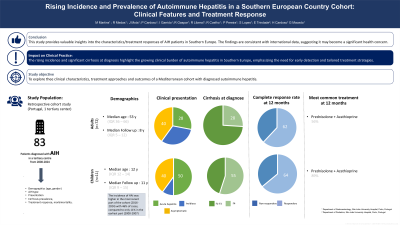Tuesday Poster Session
Category: Liver
P4650 - Rising Incidence and Prevalence of Autoimmune Hepatitis in a Southern European Country Cohort: Clinical Features and Treatment Response
Tuesday, October 29, 2024
10:30 AM - 4:00 PM ET
Location: Exhibit Hall E

Has Audio
- MM
Miguel Martins, MD
Centro Hospitalar Universitário de São João
Porto, Porto, Portugal
Presenting Author(s)
Miguel Martins, MD, Renato Medas, MD, Joana Mota, MD, Pedro Cardoso, MD, Isabel Garrido, MD, Rui Gaspar, MD, Rodrigo Liberal, MD, PhD, Rosa Coelho, MD, Pedro Pereira, MD, PhD, Susana Lopes, MD, PhD, FACG, Eunice Trindade, MD, PhD, Helder Cardoso, MD, Guilherme Macedo, MD, PhD, FACG
Centro Hospitalar Universitário de São João, Porto, Porto, Portugal
Introduction: Limited data exists on Mediterranean patients with autoimmune hepatitis (AIH). This study aimed to explore their clinical characteristics, treatment approaches, and outcomes.
Methods: A retrospective analysis of 83 patients diagnosed with AIH at a tertiary center in Porto, Portugal (2000-2024) was conducted. Data on age, gender, AIH type, presentation type, cirrhosis prevalence, treatment response, morbimortality were collected.
Results: The cohort comprised 83 cases of AIH (72 adults, 11 children). Females were 74%. Median age at diagnosis was 53 (IQR 36–66) for adults and 12 years (IQR 12–14) for children. Type 1 AIH was dominant (71% in adults and 64% in children). Overlapping criteria were observed in 7 cases. Regarding the presentation, 28% of adults and 50% of children had acute hepatitis, while 32% of adults and 10% of children had insidious symptoms, and the remainder were asymptomatic. The incidence was higher in the recent tercil of the cohort (2016-2024) with 46% of cases and only 11% in the earliest tercil (2000-2007). At diagnosis, liver biopsy revealed that 26% of adults and 55% of children had cirrhosis. After 12 months of treatment, most patients were on prednisolone plus azathioprine (56% of adults and 89% of children), with response rates of 62% in adults and 64% in children. For non-responders, second-line medications with mycophenolate or tacrolimus were administered. The median follow-up was 8 years in adults (IQR 5–12) and 11 (years IQR 9–15) in children. Two children needed a liver transplant, all others were alive at follow-up. Two adults died from a non-liver-related cause, and none required liver transplantation.
Discussion: This study provides valuable insights into characteristics and treatment responses of AIH patients in Southern Europe. A growing incidence and prevalence were observed. The findings are consistent with international data, suggesting it may become a significant health concern.
Disclosures:
Miguel Martins, MD, Renato Medas, MD, Joana Mota, MD, Pedro Cardoso, MD, Isabel Garrido, MD, Rui Gaspar, MD, Rodrigo Liberal, MD, PhD, Rosa Coelho, MD, Pedro Pereira, MD, PhD, Susana Lopes, MD, PhD, FACG, Eunice Trindade, MD, PhD, Helder Cardoso, MD, Guilherme Macedo, MD, PhD, FACG. P4650 - Rising Incidence and Prevalence of Autoimmune Hepatitis in a Southern European Country Cohort: Clinical Features and Treatment Response, ACG 2024 Annual Scientific Meeting Abstracts. Philadelphia, PA: American College of Gastroenterology.
Centro Hospitalar Universitário de São João, Porto, Porto, Portugal
Introduction: Limited data exists on Mediterranean patients with autoimmune hepatitis (AIH). This study aimed to explore their clinical characteristics, treatment approaches, and outcomes.
Methods: A retrospective analysis of 83 patients diagnosed with AIH at a tertiary center in Porto, Portugal (2000-2024) was conducted. Data on age, gender, AIH type, presentation type, cirrhosis prevalence, treatment response, morbimortality were collected.
Results: The cohort comprised 83 cases of AIH (72 adults, 11 children). Females were 74%. Median age at diagnosis was 53 (IQR 36–66) for adults and 12 years (IQR 12–14) for children. Type 1 AIH was dominant (71% in adults and 64% in children). Overlapping criteria were observed in 7 cases. Regarding the presentation, 28% of adults and 50% of children had acute hepatitis, while 32% of adults and 10% of children had insidious symptoms, and the remainder were asymptomatic. The incidence was higher in the recent tercil of the cohort (2016-2024) with 46% of cases and only 11% in the earliest tercil (2000-2007). At diagnosis, liver biopsy revealed that 26% of adults and 55% of children had cirrhosis. After 12 months of treatment, most patients were on prednisolone plus azathioprine (56% of adults and 89% of children), with response rates of 62% in adults and 64% in children. For non-responders, second-line medications with mycophenolate or tacrolimus were administered. The median follow-up was 8 years in adults (IQR 5–12) and 11 (years IQR 9–15) in children. Two children needed a liver transplant, all others were alive at follow-up. Two adults died from a non-liver-related cause, and none required liver transplantation.
Discussion: This study provides valuable insights into characteristics and treatment responses of AIH patients in Southern Europe. A growing incidence and prevalence were observed. The findings are consistent with international data, suggesting it may become a significant health concern.
Disclosures:
Miguel Martins indicated no relevant financial relationships.
Renato Medas indicated no relevant financial relationships.
Joana Mota indicated no relevant financial relationships.
Pedro Cardoso indicated no relevant financial relationships.
Isabel Garrido indicated no relevant financial relationships.
Rui Gaspar indicated no relevant financial relationships.
Rodrigo Liberal indicated no relevant financial relationships.
Rosa Coelho indicated no relevant financial relationships.
Pedro Pereira indicated no relevant financial relationships.
Susana Lopes indicated no relevant financial relationships.
Eunice Trindade indicated no relevant financial relationships.
Helder Cardoso indicated no relevant financial relationships.
Guilherme Macedo indicated no relevant financial relationships.
Miguel Martins, MD, Renato Medas, MD, Joana Mota, MD, Pedro Cardoso, MD, Isabel Garrido, MD, Rui Gaspar, MD, Rodrigo Liberal, MD, PhD, Rosa Coelho, MD, Pedro Pereira, MD, PhD, Susana Lopes, MD, PhD, FACG, Eunice Trindade, MD, PhD, Helder Cardoso, MD, Guilherme Macedo, MD, PhD, FACG. P4650 - Rising Incidence and Prevalence of Autoimmune Hepatitis in a Southern European Country Cohort: Clinical Features and Treatment Response, ACG 2024 Annual Scientific Meeting Abstracts. Philadelphia, PA: American College of Gastroenterology.
